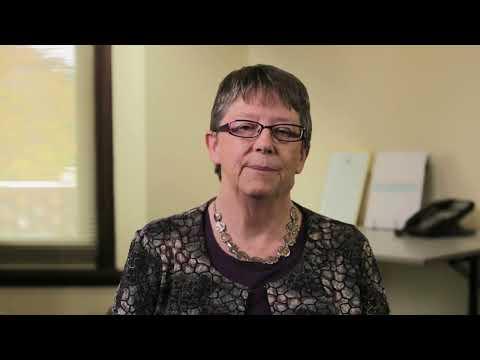Residential care
As dementia progresses, it can become harder for someone with the condition to live at home. They might need more support or medical care, or living at home may no longer be safe for them.
If you’re caring for someone with dementia, you may need to make the decision to move them to residential care. This can be a very difficult decision, and it’s normal to feel a mix of emotions: loss, guilt and even relief. That’s normal. Be kind to yourself and make sure you get the support you need.
It can also be a stressful and challenging process, particularly if your loved one needs to move into residential care quickly: after a hospital admission, for example. It’s worth making a plan and researching your options ahead of time, as this can reduce stress and help you to make the best decision.
These are the key steps of the process for moving into residential care, as well as things to look for when you’re choosing a home.
Types of residential care

There are a few different types of residential care, which provide varying levels of support:
- Low-level care: This supports people who are mobile but need some assistance, such as help with personal care, laundry or shopping.
- High-level care: This provides 24-hour nursing care. It is often a good option for people in the later stages of dementia.
- Dementia-specific units: These units are designed specifically for people with dementia, and may offer low-level or high-level care. Not all people with dementia need to live in a dementia-specific unit — they’re usually best for people with special care needs.
Being assessed for residential care
If you’re considering residential care, the first step will be an assessment of your loved one’s eligibility.
If they’re over 65, you’ll work with My Aged Care. These are the steps:
- Check your loved one’s eligibility and apply for an assessment on the My Aged Care website. You can also call My Aged Care on 1800 200 422.
- If the application is successful, My Aged Care will arrange for your friend or family member to be assessed at home by an Aged Care Assessment Team (ACAT). The ACAT will assess their needs and determine the level of care they require.
- If your loved is eligible for residential care, the ACAT will provide a support plan that lists suitable types of care, including any specialist care (like dementia care). The ACAT can also refer your loved one to a residential care home, or you can directly contact care homes yourself.
If they’re under 65, the process takes place through the National Disability Insurance Scheme (NDIS). For more information, see our NDIS support page.

Choosing a residential care home
Trying to find the right residential care home can be overwhelming, so it’s helpful to break it down into steps.
Making a shortlist
First, review the homes that provide the level of care that the Aged Care Assessment Team has recommended, then make a shortlist. These are some things to consider:
- Location: This is usually the first thing to think about. Is there a location that your loved one would prefer? For example, if they’ve lived in a regional town all their life, they may want to stay nearby. Is that location convenient for family, friends and visitors? This will help them to keep in contact with loved ones.
- A dementia-friendly focus: more on this below.
- Language and cultural practices: Does your friend or family member prefer to speak in a language other than English? Do they have cultural or religious practices or traditions that they observe? Can the home support this?
- Individual needs: Does the home provide appropriate, sensitive care for:
- your sexual and gender identity
- your cultural background?
My Aged Care has a Find a Provider tool that allows you to filter by location, care needs, cultural needs and other preferences.
It’s also worth thinking about cost, as your loved one may need to pay a number of different fees for their care. Some of these fees are means-tested, which means your friend or family member might be eligible for government funding. My Aged Care has more information about the different fees, as well as a Fee Estimator tool.
Finding a dementia-friendly home
When you’re researching different care homes, think about how they support people with dementia. You’ll probably have your own priorities and needs, but these are some things to look for:
- Do staff have training and skills in dementia care?
- Does the home have a focus on resident-centred care? For example, do staff tailor their care for each resident’s individual needs?
- Does the home actively create and promote a dementia-friendly environment? Below, we’ve listed some things to look out for when you visit your shortlisted homes.
- Does the home involve family and friends? For example, do they consult and actively involve them in care planning?
- Do they have strategies in place to support pain management for people with dementia?
- Do they avoid using physical restraints or chemical restraints (like using tranquillisers or sedatives outside of normal medical treatment), apart from in extreme circumstances?
- Do they provide access to dementia specialists and relevant allied health professionals, such as physiotherapists, speech pathologists and dietitians?
Visiting the shortlisted care homes
Once you have a shortlist of residential care homes, arrange to take a tour. We’d suggest visiting at least three homes. A good care home will be happy to show prospective residents, friends and family around.
To get the most from your visit:
- consider taking a friend or family member, as there can be a lot to think about
- pre-prepare a list of questions and things you want to find out
- take notes as you go
- trust your intuition and common sense when you’re assessing the home.
Questions to ask yourself
As well as the considerations listed above, these are some things to look out for when you tour a home.
General atmosphere
- Does the residence feel home-like, welcoming and friendly?
- Do management and staff greet you? Do they listen to you and ask for information?
- What are residents doing? Do they look comfortable, happy and well-cared for?
- Do staff seem to respect the residents?
Facilities and environment
- Is the home clean and well-organised?
- Are residents’ rooms well-maintained? Are they treated as residents’ own private spaces?
- Is there an accessible, sun-protected outdoor space? Is it used?
- What activities and outings are on offer? Do these reflect your loved one’s hobbies and interests?
- Are there any other services, like hairdressing or massage?
- What belongings can your loved one bring into the home?
Dementia-friendly design
- Is it obvious how to get to the toilet?
- Is there clear signage to help people who might be lost or disoriented?
- Is it easy to move around the home? Are potential obstacles moved out of the way?
- Do fixtures and furnishings use contrasting colours, where relevant?
- Are private rooms decorated with home-like furnishings that aren’t too distracting? Would your friend or family member feel comfortable with the decoration?
- Does the home have quiet, private spaces?
- Is it clear to residents where they should go for help?
Medical treatment and care
- How does the home manage medical or clinical care needs?
- Can residents have their own doctor?
- What is the home’s policy on prescribing medication?
Engagement with family and friends
- How are staff assigned to families and residents? Ideally, residents and families should be assigned a specific staff member who can answer their questions.
- Is there a family/carer group or committee? This allows families to connect and share their experience.
- What are visiting times and access like? Can you easily organise outings, overnight stays and holidays with your loved one?
- Can you be involved in your loved one’s care? For example, can you help them to shower or eat?
Other considerations
- If your loved one’s care needs increase, can the home support this?
- Has management clearly explained the fee structure?
- Does the home provide any help in preparing for the move?
Moving into residential care

Once you’ve decided on a care home, it’s time to start organising the move. You might need to make a decision very quickly once a place becomes available, so it’s worth working out in advance what you need to do. My Aged Care has a useful checklist of administrative tasks to get you started.
This might be a frightening or disturbing process for your loved one, but there are some things you can try that might help:
- Explain simply and gently where and why they are moving. Try emphasising positive aspects, like new friends and fun activities.
- If you can, introduce them to the new home gradually. This helps it to become more familiar and less confusing.
- Decorate their new room with items from home, like family photos, prints and bed covers. You might also want to bring favourite books, music or movies.
- Mark all their personal items with large, easy-to-read labels, so their belongings aren’t lost.
It’ll probably take time for both you and your loved one to adjust to the new situation—this is normal. Your friend or family member will settle in to their new home, even if it takes a bit of time. In fact, many people with dementia actually feel better in a structured environment, as they’re more secure and get more stimulation.
There’s no right or wrong way to approach this adjustment period. You might want to visit often, or you might need some time to rest and recover. Whatever approach is right for you, our Visiting someone with dementia page has advice on how to make each visit as rewarding and enjoyable as possible.

Working with the care home
Once your friend or family member has moved into residential care, your role will change—but you can still play an important part in their care.
Your friend or family member will get the best possible care if you and the care home staff can form a partnership together. You’re the expert on your loved one, and your involvement should be welcomed and encouraged. This includes:
- asking you for information about your loved one’s background, past employment, culture, religion, hobbies and activities, likes, dislikes and daily routines
- working with you to develop a care plan, and reviewing it with you regularly
- consulting you about managing behaviour changes
- inviting you to help out with practical tasks and activities, including outings
- encouraging your feedback on things like meal times, menus, activities and communication.
It’s entirely up to you how involved you are. You need to look after yourself, as well as feeling comfortable about your loved one’s care.
Making a complaint
If you’re unhappy with the care that your loved one is receiving, talk directly to the residential care home. Every care home will have a complaints process, which should be outlined in its handbook or another document.
If you’re not comfortable contacting the care home, or they don’t solve the problem, you can make a complaint.
If your loved one receives an Australian government funded aged care service, visit the Aged Care Quality and Safety Commission website or call 1800 951 822.
Or, if they’re supported through the NDIS, visit the NDIS Quality and Safeguards Commission website or call 1800 035 544.
It’s okay to take care of your own health and happiness. If you're struggling as someone who cares for a person with dementia, contact the free, confidential National Dementia Helpline on 1800 100 500, any time of the day or night, for information, advice and support.
